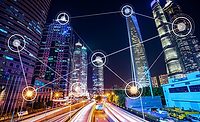Over 30 years ago, authorities in urban centers such as Amsterdam, Copenhagen and Geneva pioneered the first smart city projects. Their main goal was to facilitate operations and improve the well-being of citizens using Information and Communication Technologies (ICT). These early initiatives mainly involved increasing internet availability and digitalization of administrative tasks and services.
Today, smart city projects span dozens of cities across six continents, predominantly in Europe, North America, and East Asia. Sensors, connected infrastructure, and mobile devices aid in the sustainable development and operation of urban environments, enhancing waste management, supply distribution, traffic flow and more.
Smart city solutions continue to evolve, using technologies like big data and IoT to face old and new challenges — most recently, the coronavirus and data privacy issues. Let’s explore how big data developers are helping cities tackle these difficulties and shape the future of intelligent urban centers worldwide.
Smart cities versus the pandemic
If there’s a positive side to the coronavirus crisis, it’s the fact that it has sped up the adoption of smart city projects.
To keep the virus in check, municipalities leveraged technology to streamline healthcare access, ensure quarantine measures, and limit contact between citizens. A report by Oracle revealed that 65% of city leaders named realizing the importance of smart city implementation the most important lesson learned during the pandemic. Let’s look at three examples of how some countries and cities adopted smart city projects to flatten the curb.
South Korea, a highly urbanized country that garnered universal praise for efficient control of the virus in the first months of the pandemic, owes its success in part to intelligent city technologies. The primary objective of South Korean policymakers was to use day-to-day data to track the mobility of infected citizens and enforce containment regulations when necessary.
To that end, the police granted epidemiological investigators access to vast amounts of citizen data. These included mobile phone location, public transport history and cashless transactions records, as well as CCTV recordings and heatmap tracking. Aggregating this information was enabled largely by smart city infrastructures such as transport card readers and monitoring systems. These across-the-board measures allowed the country to go largely unscathed by the socioeconomic impact of lockdown.
Chicago provides another remarkable example. The Windy City partnered with a healthcare tech company to collect anonymous location data from citizens’ mobile phones. The technology compared device location during night and day in 30-minute intervals to determine how much time the user spends self-isolating at home instead of going out. The solution also leverages artificial intelligence (AI) and big data to analyze movement patterns in and outside the city to build spread models. According to city officials, that information helped Chicago significantly flatten the curve, preventing close to 2,000 deaths.
In Europe, Italy was among the countries hit hardest by the virus. As a result, the country’s municipalities launched smart city initiatives to ensure a timely and safe recovery from the lockdown. For example, the city of Florence uses the Smart City Control Room (SCCR) system to gather big data from diverse periods and sources such as traffic and pollution sensors, public Wi-Fi spots, and venues like museums, parks, or shopping malls. Then, the system turns this information into valuable insights into citizen mobility or potentially overcrowded spaces. The project is now planned to expand to other cities in the region.
Smart cities and data privacy
Increasing reliance on technology and data can improve the quality of life in urban spaces and help them face the challenges of the global pandemic. However, the dependence can expose cities and their inhabitants to data privacy challenges.
Mistrust can severely hamper the development of smart city projects, which rely on a high level of cooperation between all involved parties: officials, service providers, tech companies, and, most importantly, citizens themselves. For any data-driven smart city project to be successful, it must communicate its value and data safety to its primary stakeholders — the citizens.
Big data-based urban initiatives must also provide transparency in terms of data sources and how they are used. In general, data can fall into two categories:
● Personally identifiable — all information that can be associated with personal details, e.g., name, address, location, specific email addresses, IP numbers, and health records.
● Non-personally identifiable — information that cannot be used to identify an individual, e.g., non-specific email address or anonymized data.
The classification is vague, and its interpretation varies wildly depending on the country. The General Data Protection Regulation (GDPR) places strict restrictions on the use of personal data of all EU citizens and residents. Meanwhile, less stringent laws in other countries allow authorities to easily implement special measures if need be, as it was the case with South Korea.
In extraordinary circumstances, such as the pandemic, cities and countries normally bound by strict data protection regulations usually have legal ways to relax them temporarily if it serves a greater purpose. This may seem disturbing for some, but in fact, when big data programs are implemented properly, sharing data can be voluntary, and personal information may remain undisclosed publicly or anonymized.
Data privacy is one of the main concerns of many new and upcoming intelligent city projects. Launched in January 2021, the EU’s Citizen Control of Personal Data initiative focuses on encouraging citizens to share their details for the general good and giving them greater agency over the distribution and use of data. The goal of the platform is to reach 300 million citizens by 2025.
In London, the UK, the plans for future development will be informed by the new Emerging Technology Charter. The charter will serve as a guide for Londoners to learn how new smart city tech will affect their lives and use their personal information. The program’s ultimate goal is to stimulate innovation and get citizens involved in the process. More initiatives like this one can be found worldwide.
The future of big data in cities
Although we tend to think of smart cities as futuristic innovations, the transition has been already ongoing for many years. Building sustainability and resilience through data without compromising citizens’ details is a demanding challenge that municipalities need to focus on now, not in the future.



